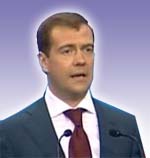Russian President Medvedev meets with German Chancellor Merkel
 Moscow/Kiev - Russian President Dmitriy Medvedev and German Chancellor Angela Merkel on Thursday were at odds over the Caucasus in opening statements delivered at an international forum devoted to soothing rising tensions between Moscow and Western nations.
Moscow/Kiev - Russian President Dmitriy Medvedev and German Chancellor Angela Merkel on Thursday were at odds over the Caucasus in opening statements delivered at an international forum devoted to soothing rising tensions between Moscow and Western nations.
Merkel, in her opening remarks at the conference, called "The Petersburg Dialogue" called for increased understanding between Europe and the Kremlin, but at the same time criticized Medvedev and his government for Russia's hardline policies in Georgia.
"The Russian reaction in this conflict (the Russo-Georgian war) we consider to be disproportionate and we said (to the Russians), that we now need to build trust," Merkel said.
A key first step would be withdrawal of all Russian troops from Georgian territory by October 10 in line with a European Union- brokered ceasefire between Moscow and Tbilisi, she said.
Medvedev, in his opening remarks, anticipated Merkel's criticism, calling Georgia's August attack on the renegade province South Ossetia "aggressive nationalism," and international claims Russia was the attacker in the conflict "dishonest propaganda."
The world, despite worsening relations between Moscow and NATO nations over Georgia, would nonetheless never see a new Cold War, Medvedev claimed, "Because there are no reasons for it."
Russia and Germany have "differing views on this matter (the Caucasus situation)," Merkel said.
Western nations and Russia need to engage each other in a series of "preventative talks" to forestall future conflicts, and to prepare the ground for cooperation, she said.
Russo-European coordination over the role of military observers deployed to Georgia from the Organization of Security and Cooperation in Europe (OSCE) is one of first topics requiring greater mutual understanding, Merkel said.
Russian combat forces on Wednesday delayed and in some places restricted the movement of OSCE observers through a buffer zone in South Osseia, despite European claims the observers should be allowed to travel unhindered.
Merkel named as other areas of disagreement requiring further discussion the renegade Moldovan province Transnistria, Kosovo, and Bosnia-Herzogovina - all European territories over whose future status Russia and NATO nations sharply disagree.
Medvedev called for more clarity and direct talk between Russia and the West, saying what was needed was "the voice of truth stated loudly."
"We have to accept the mutual dependance of countries and nations in the modern world," Medvedev said. "This interdependence does not only apply to economies, but the spheres of science, technology, culture, and education."
"We need to go forwards, and not focus on the past," Medvedev said. dpa( )